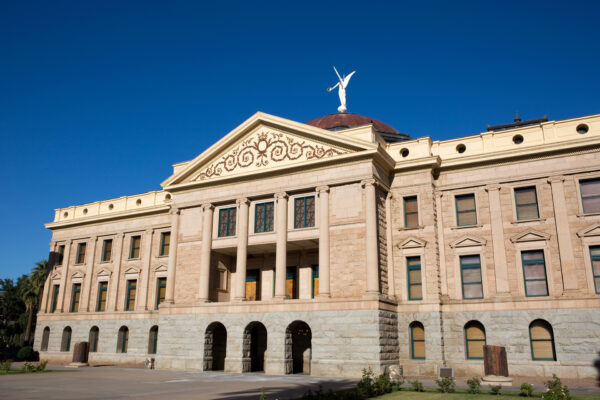After a long and tough 170 days, the 2021 Arizona legislative session wrapped up on June 30, 2021. While some bills passed that threaten civil liberties, we are excited about the passage of new laws that will decrease student push-out, improve the healthcare for women and pregnant persons in prison, and ensure that if we ever face a pandemic again, healthcare will be provided in a manner that does not discriminate based on disability or race. Here is a brief overview of the work the ACLU of Arizona completed during the 2021 legislative session.
Making School Suspensions and Expulsions a Thing of the Past
Victory! After several years advocating for discipline reform in Arizona, we are excited to see the passage of HB 2123, the first step in making sure kids remain in the classroom. HB 2123 restricts zero-tolerance policies in Arizona schools — policies that often discriminate against students of color and students with disabilities.
HB 2123 prohibits the suspension or expulsion of any student under seven years of age. In addition, HB 2123 requires that for any student in the fourth grade or lower, a school may only suspend or expel the student if they commit a serious or dangerous offense. Students who have been suspended or expelled are 10 times more likely to drop out of high school than those who have not, impacting the lifetime earnings and employment opportunities of these students. Furthermore, research shows that exclusionary discipline practices are ineffective – schools with higher suspension rates tend to have lower academic quality, worse school climate, and receive lower ratings on school governance measures.
HB 2123 is a great first step to curb the over-usage of suspensions and expulsions in Arizona schools and keep children in the classroom where they will receive the resources necessary to help them succeed. We thank Stand for Children and others for their partnership in passing this long-overdue reform.
Providing Pregnant Persons and Women the Care They Need
In the last 20 years Arizona’s women prison population has doubled.[1] The explosion in Arizona’s women prison population has outpaced a system that was originally designed to house a large, mostly male population, causing serious failings in the medical treatment incarcerated women receive. Increasingly, Arizona prisons fail to provide women basic hygiene or healthcare and struggles to help families stay together.
That is why a bipartisan group of advocates, including many women who experienced first-hand the lack of healthcare in Arizona prisons, came together to support the Dignity Act. The Dignity Act will improve healthcare, hygiene, and prenatal care for women in prison and give parents an opportunity to maintain relationships with their young children by ensuring they receive physical visitation and requiring parents to be placed within 250 miles of their minor children when practicable.
The Dignity Act will improve healthcare outcomes for incarcerated women in a way that promotes self-respect, strengthens families, and reduces recidivism. We are proud to be amongst the bipartisan coalition supporting this important legislation.
Ensuring Healthcare is Non-Discriminatory
During the height of the covid pandemic, disability advocates learned a startling truth – Arizona’s crisis standards of care (CSCs), implemented when healthcare must be rationed, did not provide federally mandated protections against discrimination for persons with disability, persons of color, or persons of advanced aged.
To ensure that all persons have equal access to healthcare, a coalition of advocates including the ACLU of Arizona, Arizona Center for Disability Law, and The Arc of Arizona, supported HB 2386. This legislation provides much-needed nondiscrimination protections for persons with disabilities, persons of advanced age, and communities of color in the administration of Arizona’s CSC.
HB 2386 would require, in part, any crisis standard of care adopted or established by the state to specify:
- Each patient has a right to an individualized assessment,
- A patient or a patient’s health care decision-maker has the right to make the patient’s healthcare choices,
- Decisions on the allocation of heath care resources may not discriminate on the basis of disability, age, race, religion, sex, veteran status or income status,
- Persons with disabilities and the aged have the right to reasonable accommodations to ensure that all patients have equal access to medical care, and;
- Disability advocates must be part of any committee that creates future crisis standards of care.
HB 2386 provides fundamental nondiscrimination protections so that future CSCs are written and implemented in a manner that ensure equality of care for all patients.
Protecting Our Right to Protest
Last year, we saw historic protests as millions of Americans protested the continued killings of Black and Brown people at the hands of police. Rather than listen to cries for justice, politicians introduced several bills that infringed on people’s First Amendment right to protest against police brutality and government abuse.
The most troubling of those bills, HB 2309, would have made it a felony to be in a group of six or more people where a person is injured, or property is damaged. In addition, HB 2309 increased the penalty for numerous crimes from a misdemeanor to a felony if they were committed during a protest. The vague and overly broad nature of HB 2309 violated the First and Fourteenth Amendment to the U.S. Constitution. With the help of allies such as Mass Liberation and Progress Arizona, we were able to stop HB 2309 before it passed.
Supporting Equality in the Classroom
SB 1456 would have singled out queer students by requiring parents or guardians to opt their student into any instruction regarding sexual orientation, gender identity, or gender expression. By forbidding the presentation of medically accurate, age-appropriate information critical for the health and safety of LGBTQ students, SB 1456 would have deprived LGBTQ students of equal educational opportunities and exacerbated the heightened health risks LGBTQ students already face.
In addition, SB 1456 would have chilled all students’ ability to learn about LGBTQ persons contributions to art, science and literature, and prohibited discussion of LGBTQ history including the Stonewall Protests, the AIDS epidemic and marriage equality. Such bigotry has no place in Arizona classrooms. We were excited to be able to work with a coalition including Equality Arizona, Human Rights Campaign, Secular AZ, and Planned Parenthood to defeat this harmful, bigoted legislation.
While we celebrate the major victories and defeats, unfortunately, some bills that threat the constitutional rights of Arizona residents did pass this session.
Defending Reproductive Freedom
A hard-fought loss, SB 1457 threatens doctors with criminal prosecution for providing necessary medical treatments that are the standard of care. By linking criminal penalties with the provision of reproductive healthcare services, SB 1457 undermines a physicians’ ability to provide the best care to their patients and could have a chilling effect on their willingness to provide certain types of health care altogether.
For instance, SB 1457 could deter doctors from providing abortion services for non-viable fetuses for fear of criminal prosecution. And people seeking abortion and experiencing pregnancy loss could be subjected to criminal investigation for accessing essential health care. Nearly 1 in 3 women will have an abortion by the time they turn 45. It’s important that people can talk to their doctor about their health care options without politicians restricting or intruding upon those conversations.
Signed by Governor Ducey, this law will have a chilling impact on people’s relationships with their doctors and will make it harder for families to have honest and informed conversations with their health providers.
We may not all feel the same way about abortion, but most agree that these are personal, private decisions between a pregnant person, their family and their doctor. This bill is way too extreme for Arizona and will result in worse care for persons who are pregnant.
Protecting Our Right to Vote
We saw numerous attacks on Arizonans right to vote this session. While numerous provisions were defeated, a couple measures passed that will restrict Arizonans’ access to the ballot box and undermine confidence in our elections.
SB 1485 changes the Permanent Early Voter List (PEVL) to the Temporary Early Voter List, by requiring election officials to remove persons from the early voter list if they fail to early vote in two consecutive primary and general elections.
SB 1003 changes the ability for voters to cure their ballot for a mismatched signature from 5 days after the election to 7:00 PM on election day, meaning that many eligible voters, including persons with disabilities and the aged, will not have a meaningful opportunity to correct their ballot if it is rejected due to a mismatch signature
Finally, a provision in the budget requires the secretary of state to grant access to the statewide voter registration database to the Attorney General’s Election Integrity Unit and to whomever the legislature chooses…like the inexperienced firm Cyber Ninjas. If the Attorney General or the outside third party decide that certain voters are ineligible, the SOS and County Recorders must remove those voters from the rolls.
These attacks on our right to vote are unnecessary, corrosive to our democracy, and based on lies and conspiracy theories about our elections. The ACLU will continue to fight against laws that seek to undermine our right to vote and limit the ability of every American to participate in our elections.
Fighting for Police Accountability
Advocates, community members, and public officials across Arizona have been reimagining our policing model to create greater transparency, accountability, and justice for people harmed by police violence. Unfortunately, leadership at the Arizona legislature literally worked overtime this session to undermine and destroy the positive progress groups have made toward reigning in the worst police practices.
Members of the Arizona legislature passed several laws meant to help bad police officers evade culpability. HB 2462 creates new, unnecessary requirements for persons who seek to serve on a civilian review board that will exclude persons from over-policed communities – the very views that are most relevant to the work of a civilian review board.
HB 2567 requires that two thirds of any board or “entity” that investigates police misconduct be made up of police officers from the same department as the officer being investigated. Worse, a provision in the budget requires that every person on a board that investigates police misconduct must be a officer from the very same department as the officer being investigated.
Under HB 2550, before taking a complaint about police misconduct, officers must provide the person making the complaint an intimidating notice that states that making false allegations to a police officer is a felony. Finally, provisions in the Arizona budget would allow the Arizona Department of Public Safety to restrict public access to videos of police misconduct and violence unless the Department agrees that the videos are of public importance and every person on the video agrees to the videos release.
By passing a series of bills to help police evade oversight, the Arizona legislature undermines the relationship between police and the communities they serve, increasing the likelihood of continued police misconduct. These bills make our communities less safe.
This was a rough and tough legislative session filled with many victories and a few setbacks. We want to thank all those who worked so hard to make these successes possible and shared in our fight for liberty, including all those who were directly impacted, testified, protested, donated, spoke or joined in solidarity with the continue fight for liberty. We appreciate your support — onwards!
[1] Fwd.us, Arizona’s Imprisonment Crisis: The Harm to Women and Families, https://www.fwd.us/wp-content/uploads/2020/09/20181218_HarmToWomen_ReportFINAL.pdf



